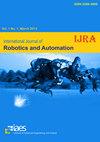人机交互(HRI)介导的学习中情感和心理联系的伦理含义
IF 1
4区 计算机科学
Q4 AUTOMATION & CONTROL SYSTEMS
International Journal of Robotics & Automation
Pub Date : 2019-08-26
DOI:10.15406/iratj.2019.05.00187
引用次数: 2
摘要
人机交互(HRI)的逐步发展以及机器人在生活的各个方面的融入对学习产生了积极的影响。然而,社会互动和情感和心理纽带的构建所产生的伦理含义尚未得到深入研究。新的机器人技术、人工智能的发展和进步,特别是面向陪伴、娱乐或教育功能的类人产品的生产1,表明出现了一种新的人类主体性。与这些新技术的相互作用是前所未有的,迄今为止,对它们的人类学和伦理学影响的研究很少。虽然这一领域确实有巨大而令人眼花缭乱的技术进步,但关于这些进步对人类状况意味着什么的反思过程需要更多的关注。这不仅是提出一个天真的反乌托邦或乌托邦愿景的问题,而且是构建一个跨学科研究和研究领域的问题[6 - 8],涉及认识论监督、伦理批评和政治影响的机制,作为人类行动的一个领域,有利于技术发展和日常生活中的应用以及医学和心理影响之间的互补(图1)。本文章由计算机程序翻译,如有差异,请以英文原文为准。
Ethical implications of emotional and psychologic ties on human-robot interaction (HRI)-mediated learning
The progressive development of the human-robot interaction (HRI) and the inclusion of Robots in different aspects of the live generate positive impacts on learning. However, the ethical implications derived from social interactions and the construction of affective and psychological bonds have not been studied in depth yet. The development and advancement of new robotic technologies, of artificial intelligence and, in particular, of the production of humanoids oriented to functions of accompaniment, entertainment or education,1 suggests the emergence of a new type of human subjectivity. The interaction with these new technologies is unprecedented and their anthropological and ethical implications are little studied so far. While it is true that there are large and dizzying technical advances in this field,1–5 reflective processes about what these advances imply for the human condition require greater attention. It is not only a matter of proposing a naive dystopian or utopian vision, but of constructing a field of trans disciplinary studies and researchD6–8 involving mechanisms of epistemological surveillance, ethical criticism and political effects as a sphere of human action that favors complementarily between technological developments and applications in everyday life and medical and psychological effects (Figure 1).
求助全文
通过发布文献求助,成功后即可免费获取论文全文。
去求助
来源期刊
CiteScore
1.20
自引率
44.40%
发文量
71
审稿时长
8 months
期刊介绍:
First published in 1986, the International Journal of Robotics and Automation was one of the inaugural publications in the field of robotics. This journal covers contemporary developments in theory, design, and applications focused on all areas of robotics and automation systems, including new methods of machine learning, pattern recognition, biologically inspired evolutionary algorithms, fuzzy and neural networks in robotics and automation systems, computer vision, autonomous robots, human-robot interaction, microrobotics, medical robotics, mobile robots, biomechantronic systems, autonomous design of robotic systems, sensors, communication, and signal processing.

 求助内容:
求助内容: 应助结果提醒方式:
应助结果提醒方式:


